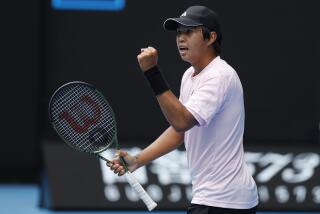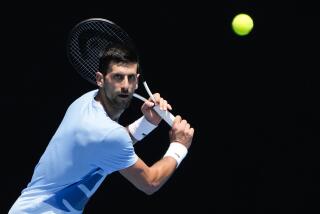Wilander Content With Status
- Share via
PARIS — In an age when it often seems that only superstars are recognized in sports, Mats Wilander is happy just being close to No. 1.
The Swedish-born Wilander lives in the tax haven of Monaco. He has plenty of money that he lets other people worry about and he likes to putter around the golf course to relax.
He’s also the world’s fourth-ranked men’s tennis player, a ranking with which, he says, he is perfectly content.
“Even if I thought that’s what it took to be No. 1, I wouldn’t train eight hours a day. It’s not worth it,” Wilander said during the first week of the French Open.”I’d like to be No. 1, but it’s not easy.”
Still six weeks shy of his 21st birthday, Wilander has been ranked in the top seven since he was 17.But earlier this year, Wilander’s play was bringing doubts whether he wanted, or deserved, to even be in the top 10.
Since successfully defending his Australian Open championshup last December, Wilander has struggled through 1985 without a tournament victory.
He was ousted in the second rounds in Philadelphia, Rotterdam and the WCT Finals in Dallas, and in the fourth round at Delray Beach, Fla. He was beaten in the semifinals at Hamburg and last week in Rome, and was a defeated finalist in Monte Carlo and Brussels.
But at the French Open, the tournament that catapulted him to fame in 1982, much of the talk is about Mats Wilander. It says the Swede is concentrating on the big events and has his game in order for this one, the world’s premier clay court contest.
“I consider the French and Wimbledon the two biggest,” Wilander said. “And also the center court here seems to suit me.”
It suited him three years ago when, at 17, he defeated Guillermo Vilas of Argentina in a marathon match to become the youngest man ever to win a Grand Slam event. That victory followed his triumph at Monte Carlo, the season’s first major clay court test. For the rest of that year, Wilander appeared unbeatable on clay.
But critics rated him suspect on faster surfaces, and fans found his methodical baseline play -- deep return after deep return until his opponent faltered -- boring.
Consecutive championships on grass at the Australian Open have given lie to the first criticism. And since mid-1984, Wilander has been attacking the net with increasing frequency, using all of the court and generating popular excitement at his matches.
Wilander makes no apologies for his earlier, patient way of winning.
“At that time, that’s all I could do,” he said. “But you do what you have to to win. Since then I’ve grown as a player. I try to improve everything.”
He added that his tentative early season play this year was due, in part, to a loss of confidence in his most effective weapon, a bullet-like backhand passing shot that kept opponents back and forced them to play his deep-court game.
More to Read
Go beyond the scoreboard
Get the latest on L.A.'s teams in the daily Sports Report newsletter.
You may occasionally receive promotional content from the Los Angeles Times.










